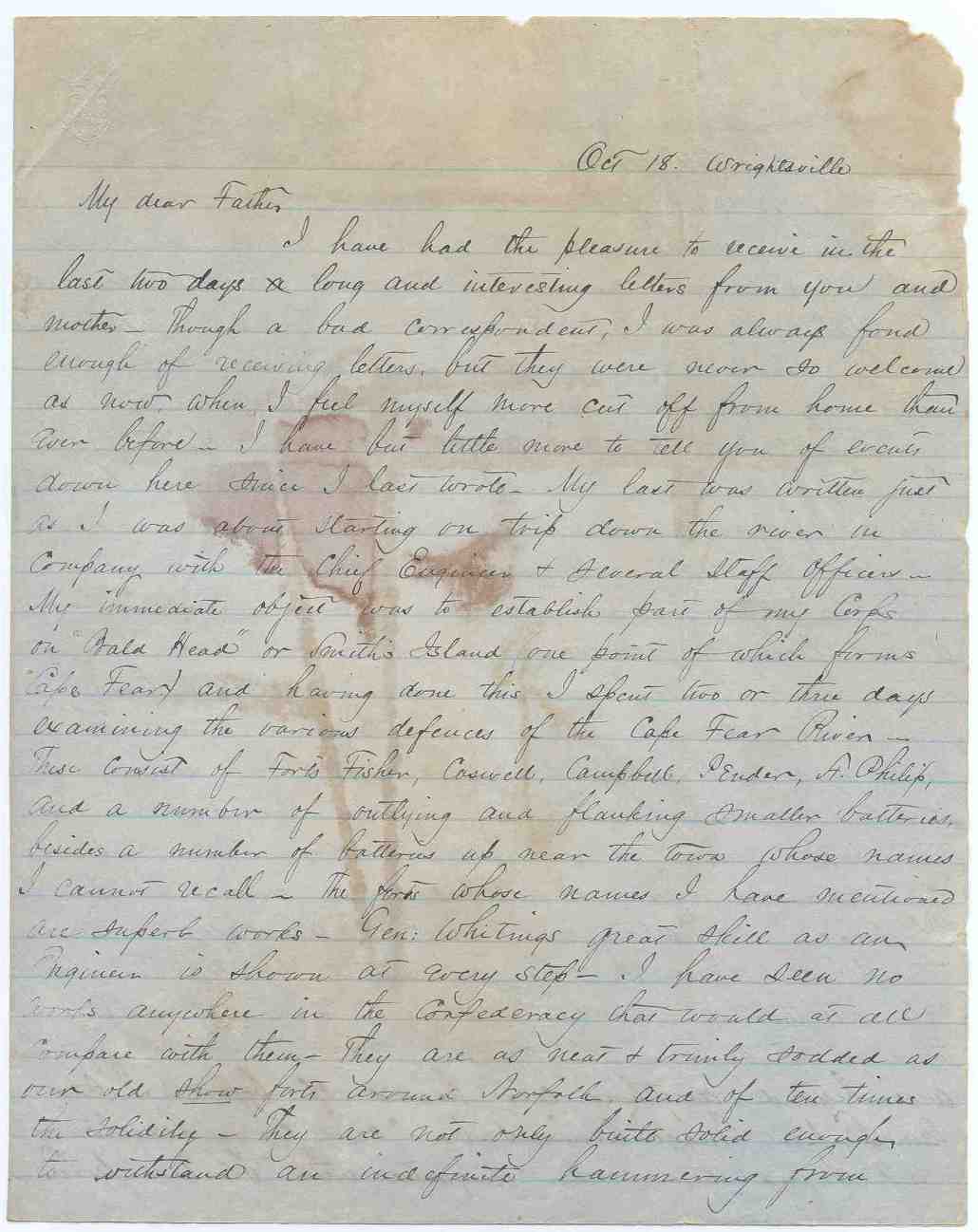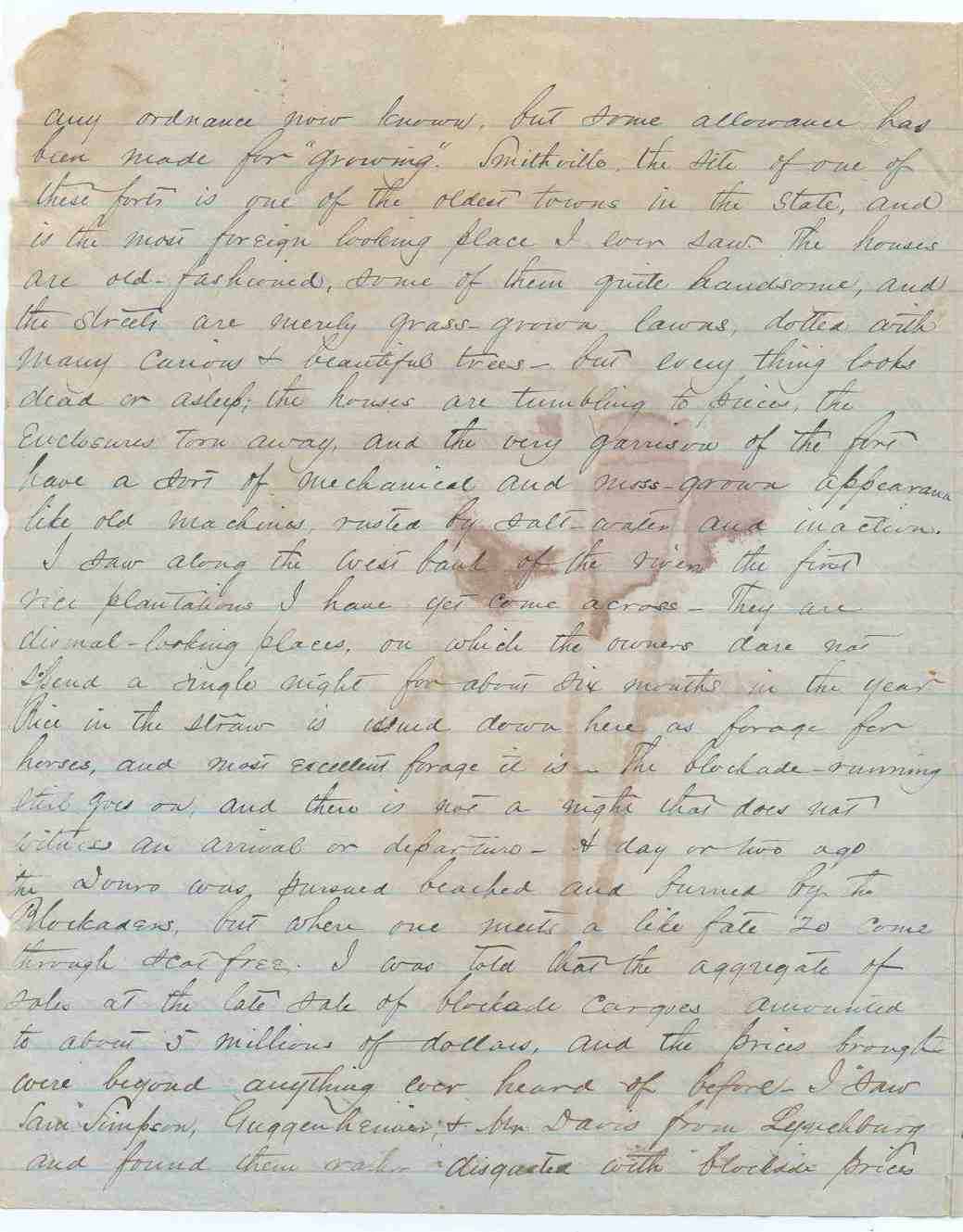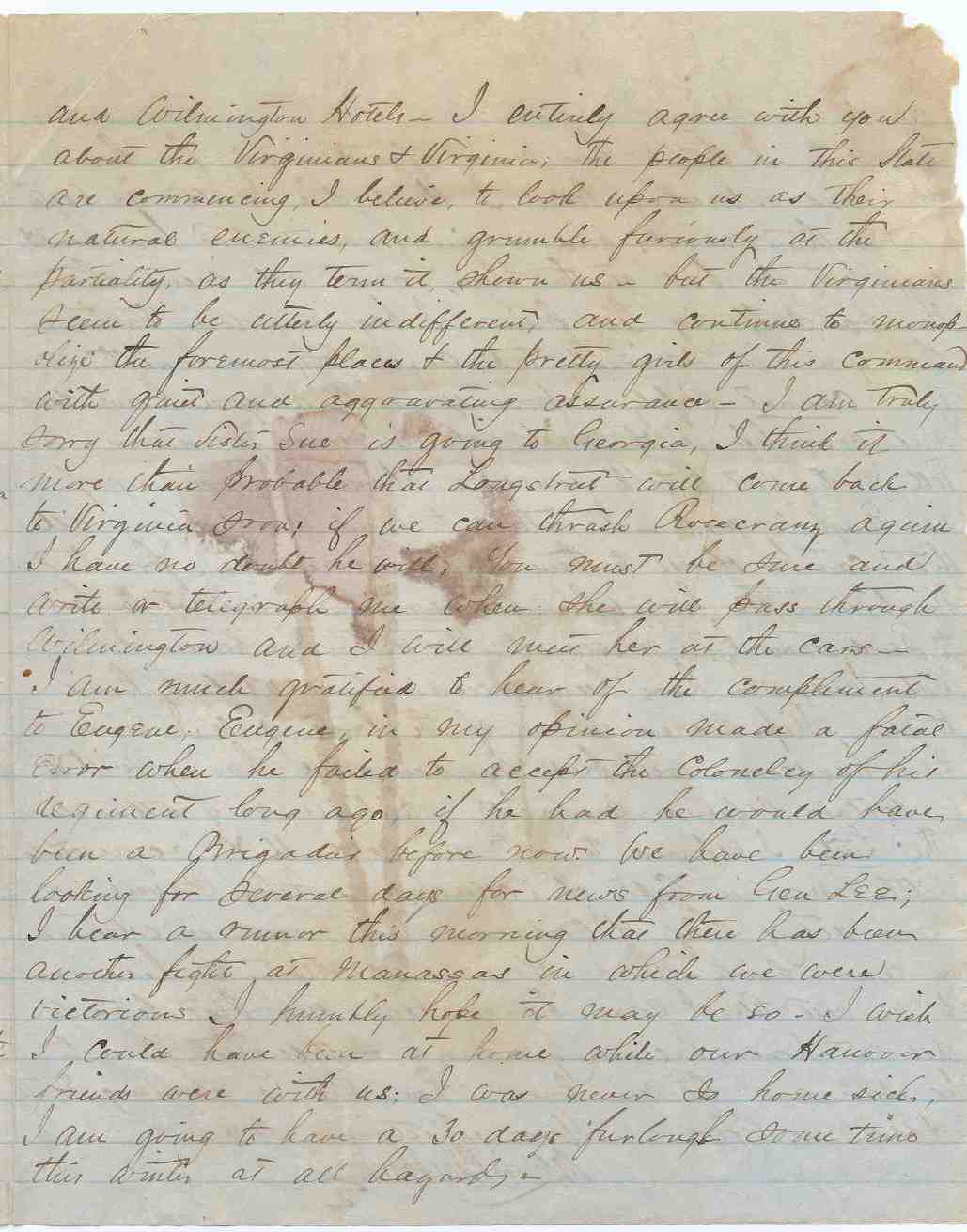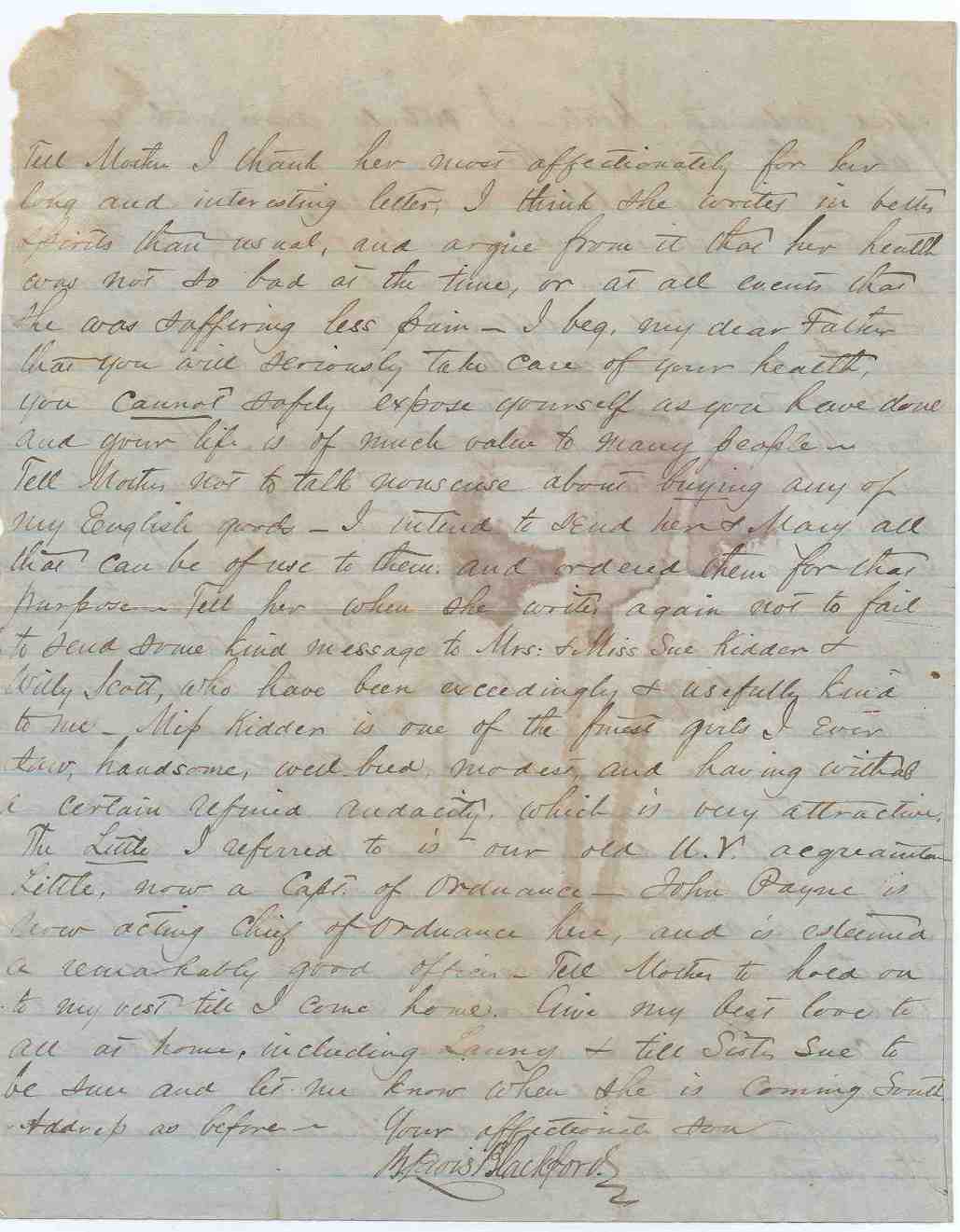Item Description: Letter, 18 October 1863, from Benjamin Lewis Blackford to his father, William Matthews Blackford, describing life at his camp near Wilmington, NC. Benjamin Lewis Blackford was born 5 August 1835, and as a child, was called “Benny.” At some point, he began to be called Lewis. Lewis attended school at Mount Airy and at the University of Virginia. Before entering the Civil War as a private in Samuel Garland’s regiment, Eleventh Virginia Infantry, he had worked as a civil engineer. Later he was a lieutenant of engineers, stationed in Wilmington, N.C. After the war, Lewis went into the insurance business in Washington, D.C., and in 1869, married Nannie Steenberger (d. 1883). They had four daughters: Elizabeth Padelford “Lily”; Mary Berkeley “Daisy”; Alice Beirne; and Lucy Landon Carter. Lewis died in 1908.
[Transcription available below image]
Item Citation: From folder 85 of the Blackford Family Papers #1912, Southern Historical Collection, Wilson Library, University of North Carolina at Chapel Hill.
Item Transcription:
Oct 18 Wrightsville
My dear Father
I have had the pleasure to receive in the last two days a long and interesting letters from you and mother. Though a bad correspondent, I was always fond enough of receiving letters, but they were never so welcome as now, when I feel myself more cut off from home than ever before. I have but little more to tell you of events down here since I last wrote. My last was written just as I was starting on trip down the river in Company with the Chief Engineer & several staff officers. My immediate object was to establish part of my Corps on “Bald Head” or Smith’s Island one point of which forms Cape Fear and having done this I spent two or three days examining the various defences of the Cape Fear River. These consist of Forts Fisher, Caswell, Campbell, Pender, St. Philip, and a number of outlying and flanking smaller batteries, besides a number of batteries up near the two whose names I cannot recall. The forts whose names I have mentioned are superb works. Gen. Whitings great skill as an Engineer is shown at Every step. I have seen no forts anywhere in the Confederacy that would at all compare with them. They are as neat & trimly sodded as our old show forts around Norfolk and of two times the solidity. They are not only built solid enough to withstand an indefinite hammering from any ordnance now known, but some allowance has been made for “growing.” Smithville, the site of one of these forts is one of the oldest towns in the State, and is the most foreign looking place I ever saw. The houses are old-fashioned, some of them quite handsome, and the streets are merely grass-grown lawns, dotted with many curious & beautiful trees, but every thing looks dead or asleep; the houses are tumbling to pieces, the Enclosures torn away, and the very garrison of the fort have a sort of mechanical and moss-grown appearance like old machines rusted by salt-water and inaction. I saw along the west bank of the river the first rice plantations I have yet come across. They are dismal-looking places, on which the owners dare not spend a single night for about six months in the year. Rice in the straw is issued down here as forage for horses, and most excellent forage it is. The blockade-running still goes on, and there is not a night that does not witness an arrival or departure. A day or two ago the Douro was pursued beached and burned by the Blockaders, but when one meets a like fate 20 come through scat free. I was told that the aggregate of sales at the late sale of the blockade cargoes amounted to about 5 millions of dollars, and the prices brought were beyond anything ever heard of before. I saw Sam Simpson, Guggenheimer, & Mr Davis from Lynchburg and found them rather disgusted with blockade prices and Wilmington Hotels. I entirely agree with you about the Virginians & Virginia; the people in this State are commencing, I believe, to look upon us as their natural enemies, and grumble furiously at the partiality, as they term it, shown us. but the Virginians seem to be utterly indifferent, and continue to monopolize the foremost places & the pretty girls of this command with quiet and aggravating assurance. I am truly sorry that Sister Sue is going to Georgia, I think it more than probable that Longstreet will come back to Virginia soon; if we can thrash Rosecranz again I have no doubt he will. You must be sure and write or telegraph me when she will pass through Wilmington and I will meet her at the cars. I am much gratified to hear of the complement to Eugine. Eugene, in my opinion made a fatal error when he failed to accept the colonelcy of his regiment long ago, if he had he would have been a Brigadier before now. We have been looking for several days for news from Gen Lee; I hear a rumor this morning that there has been another fight at Manassas in which we were victorious. I humbly hope it may be so. I wish I could have been at home while our Hanover friends were with us; I was never so home sick, I am going to have a 30 days furlough some time this winter at all hazards.
Tell Mother I thank her most affectionately for her long and interesting letter. I think she writes in better spirits than usual, and argue from it that her health was not so bad at the time, or at all events that she was suffering less pain. I beg, my dear Father that you will seriously take care of your health, you cannot safely expose yourself as you have done and your life is of much value to many people. Tell Mother not to talk nonsense about buying any of my English goods. I intend to send her & Mary all that can be of use to them, and ordered them for that purpose. Tell her when she writes again not to fail to send some kind message to Mrs. & Miss Sue Kidder & Willy Scott, who have been exceedingly & usefully kind to me. Miss Kidder is one of the finest girls I ever saw, handsome, well bred, modest, and having withal a certain refined audacity, which is very attractive. The Little I referred to is our old U.V. acquaintance Little, now a Capt. of Ordnance. John Payne is now acting Chief of Ordnance here, and is esteemed a remarkably good officer. Tell Mother to hold on to my vest till I come home. Give my best love to all at home, including Laury & tell Sister Sue to be sure and let me know when she is coming South. Address as before.
Your affectionate son
B. Lewis Blackford






What a wonderfully written letter!
Line 13 of transcription: neat and trimly sodded
The Douro was pursued beached and burned
[hagards?] is hazards